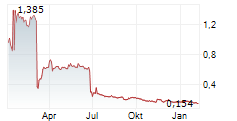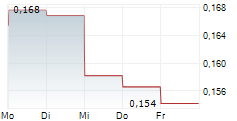
GOTHENBURG, SWEDEN / ACCESSWIRE / September 30, 2024 / IRLAB Therapeutics (STO:IRLAB-A)(FRA:6IRA) Gothenburg, Sweden, September 30, 2024 - IRLAB Therapeutics AB (Nasdaq Stockholm:IRLAB A), a company that discovers and develops new treatments for Parkinson's disease, today announces that the last patient has been enrolled in the ongoing Phase IIb study of pirepemat and that a reduction in the number of falls has been observed in the overall patient population. Pirepemat has the potential to be the first treatment in a new class of drugs aimed at reducing fall frequency in people living with Parkinson's disease. Falls are the most severe complication of Parkinson's and often lead to injuries.
"The successful completion of patient enrollment in the Phase IIb study of pirepemat is an important step in the development of pirepemat, which has the potential to reduce the number of falls in people with Parkinson's disease. We now look forward to completing the study and intensifying our activities ahead of Phase III," says Kristina Torfgård, CEO of IRLAB.
As previously communicated, the baseline (1 month) measurements show that participants in the study fall 2-3 times more than expected. More than 100 patients are now included in the study, which is considered sufficient to demonstrate a potential treatment effect with statistical certainty. Blinded data for those who completed the study show that the number of falls is reduced by about one-third compared to observations during the baseline period. As this is a double-blind study, it is not yet possible to determine how the effect differs between patients treated with pirepemat and those receiving placebo. Therefore, no conclusions can be drawn at this stage about the effect of pirepemat on the fall frequency. However, it can be concluded that participation in this study leads to a reduction in falls. For a treatment aimed at reducing the frequency of falls in Parkinson's, a clinically meaningful difference compared to placebo is estimated to be about 25%.
"Falls and the reduced quality of life, as well as the injuries they cause, are significant challenges in the treatment of Parkinson's disease. Participants enrolled in the current study are reported to be very satisfied during the treatment period. Although it is a double-blind Phase IIb study, it is interesting that a reduction in fall rate can be observed during the course of the study. We now look forward to those patients who are still under treatment completing their participation in the study," says Joakim Tedroff, Chief Medical Officer at IRLAB.
The Phase IIb study of pirepemat (IRL752C003 - React PD) is a randomized, double-blind, placebo-controlled study to evaluate the efficacy, safety and tolerability of different doses of pirepemat in people living with Parkinson's disease to determine the optimal dose for a Phase III program. In addition to safety and tolerability, the study will evaluate the effect of pirepemat on fall frequency, postural dysfunction, cognitive function, and neuropsychiatric symptoms associated with Parkinson's disease. The study is conducted at clinics in France, Poland, the Netherlands, Spain, Sweden and Germany. Patients are followed for a month-long baseline period and then treated for three months with placebo or 300 mg pirepemat/day or 600 mg pirepemat/day after which follow-up visits are conducted. Once all patients have completed the study, data management, database locking, and analysis of the data will occur. Top-line results are expected to be reported at the end of the first quarter 2025. More information can be found at EudraCT: 2019-002627-16 and www.clinicaltrials.gov: NCT05258071.
For more information
Kristina Torfgård, CEO
Phone: +46 730 60 70 99
E-mail: kristina.torfgard@irlab.se
About pirepemat (IRL752)
Drug candidate pirepemat (IRL752) has the potential to be the first treatment in a new class of drugs designed to improve balance and reduce falls and fall injuries in people living with Parkinson's disease. Pirepemat is designed to strengthen nerve cell signaling in the prefrontal cortex via antagonism at 5HT7 and alpha-2 receptors leading to increased dopamine and noradrenaline levels. 45 percent of all people living with Parkinson's fall recurrently, which approximates 2.6 million people suffering from a significantly reduced quality of life also due to fear of falling. There are no available treatments at present, despite the great medical need. Pirepemat is currently in a Phase IIb study to evaluate the efficacy, safety, and tolerability of different doses of pirepemat in people living with Parkinson's disease to identify the optimal dose for Phase III.
About IRLAB
IRLAB discovers and develops a portfolio of transformative treatments for all stages of Parkinson's disease. The company originates from Nobel Laureate Prof Arvid Carlsson's research group and the discovery of a link between brain neurotransmitter disorders and brain diseases. Mesdopetam (IRL790), under development for treating levodopa-induced dyskinesias, has completed Phase IIb and is in preparation for Phase III. Pirepemat (IRL752), currently in Phase IIb, is being evaluated for its effect on balance and fall frequency in Parkinson's disease. IRL757, a compound being developed for the treatment of apathy in neurodegenerative disorders, is in Phase I. In addition, the company is developing two preclinical programs, IRL942 and IRL1117, towards Phase I studies. IRLAB's pipeline has been generated by the company's proprietary systems biology-based research platform Integrative Screening Process (ISP). Headquartered in Sweden, IRLAB is listed on Nasdaq Stockholm (IRLAB A). For more information, please visit www.irlab.se .
Attachments
IRLAB has enrolled the last patient in the Phase IIb study of pirepemat
SOURCE: IRLAB Therapeutics




